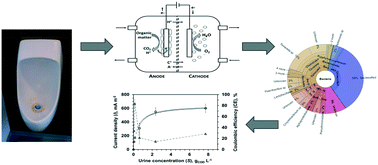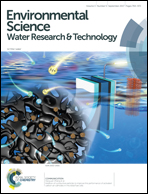Investigating bacterial community changes and organic substrate degradation in microbial fuel cells operating on real human urine†
Abstract
The present study investigates the changes in the microbial community and the degradation of organic compounds in microbial fuel cells (MFCs) operated on human urine. An anaerobic community was enriched in “urine-degrading” electroactive microorganisms by stepwise lowering the dilution factor of the anode media from 50 times diluted to undiluted urine. In a duplicated assay a current density of 495 ± 16 mA m−2, a chemical oxygen demand (COD) removal of 75.5 ± 0.7% and a coulombic efficiency (CE) of 26.5 ± 0.7% were obtained during operation on undiluted urine. In a control assay, operated on undiluted urine without the microbial enrichment procedure, a current density of only 81 ± 9 mA m−2 was obtained. The organic compounds commonly found in urine as well as the metabolic products associated with their degradation were analyzed by proton nuclear magnetic resonance (1H-NMR). The main compounds initially identified in the urine were urea, creatinine, glycine, trimethylamine N-oxide and acetate. Most of the organic compounds, except acetate, were depleted within 10 days of operation. The microbial community responsible for urine degradation in the anode of both MFCs was investigated using the Illumina MiSeq platform. Bacteria related with the Firmicutes phyla were enriched in the anodic biofilms compared to the initial anaerobic inoculum, within which Tissierella and Paenibacillus were the dominant genera. Tissierella can metabolize creatinine producing acetate whereas several bacterial species belonging to the Paenibacillus genus demonstrated the ability to function as exoelectrogens. Corynebacterium that comprise urea-hydrolysing bacteria was also amongst the main genera detected in the developed biofilms.



 Please wait while we load your content...
Please wait while we load your content...